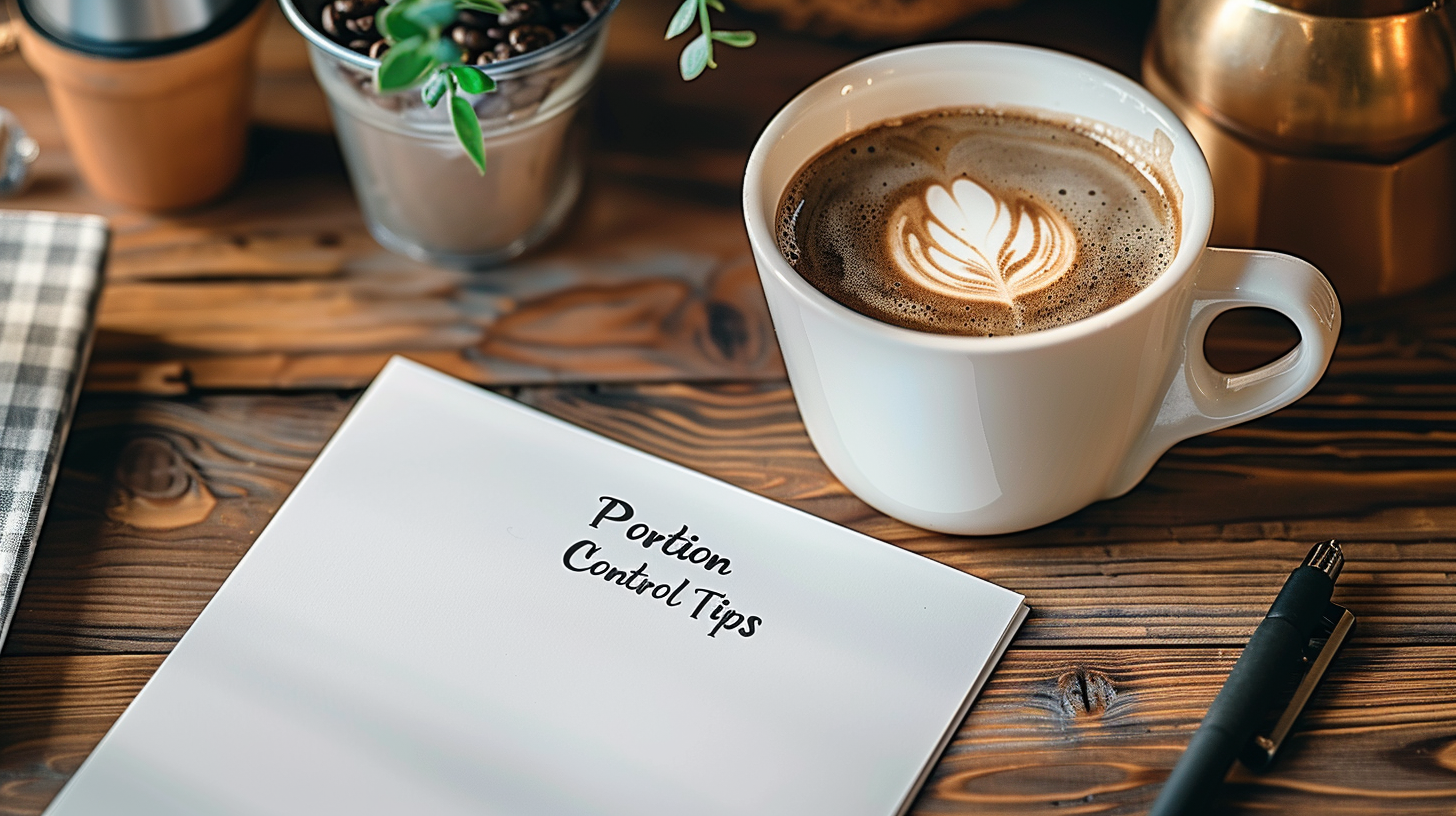
How to Control Portions and Manage Weight
Want to manage your weight? Controlling portion sizes is like painting a picture - it's all about balance and precision. By mastering the art of portion control, you can take charge of your weight and health.
It's not about deprivation, but about making smart choices. Understanding the amount of food you eat and its calorie content is key. With simple strategies and mindful eating, you can achieve your weight management goals.
Making healthier food choices and incorporating physical activity will further support your efforts. This guide will help you navigate the world of portion control and empower you to take control of your weight.
Key Takeaways
- Portion control is crucial for maintaining a healthy diet and managing weight.
- Mindful eating helps develop a healthier relationship with food and prevents overeating.
- Understanding portion sizes ensures the right amount of nutrients for the body.
- Calorie counting helps monitor energy consumption and manage weight effectively.
Importance of Portion Sizes
Understanding the importance of portion sizes can help you better manage your weight and overall health. Portion control is crucial in maintaining a healthy diet. By being mindful of your portion sizes, you can prevent overeating and ensure aboutyou're consuming the right amount of nutrients your body needs.
Mindful eating involves paying attention to your body's hunger and fullness cues, as well as being aware of the portion sizes you consume. This approach can help you develop a healthier relationship with food and prevent mindless overeating.
Understanding Calorie Intake
To effectively manage your eight, it's important to understand the role of calorie intake and portion control. Calorie counting is crucial in managing your weight as it helps you monitor the amount of energy you consume.
Understanding the nutritional value of different foods is also vital in making informed choices about your calorie intake. When planning your meals, consider the caloric content of the food items and aim for a balanced intake.
Portion control goes hand in hand with calorie intake, as it helps you manage the quantity of calories you consume. By being mindful of portion sizes and the caloric content of your meals, you can better control your weight and make healthier choices.
Strategies for Weight Loss

To achieve weight loss, start by incorporating physical activity into your daily routine. Aim for at least 30 minutes of moderate exercise most days of the week.
In addition to being physically active, focus on portion control and mindful eating. Use smaller plates to help with portion sizes and be aware of your body's hunger and fullness cues. Eat slowly and savor each bite, paying attention to the flavors and textures of your food.
Avoid distractions while eating, such as watching TV or using your phone, as these can lead to overeating. Plan your meals and snacks ahead of time to prevent impulsive eating.
Making Healthy Food Choices
As you continue managing your weight, focus on making healthy food choices that support your fitness goals and overall well-being. Practicing portion control is essential for maintaining a healthy weight. Aim to fill half your plate with vegetables and fruits, one-quarter with lean protein, and one-quarter with whole grains. This balanced approach ensures that you get a variety of nutrients while controlling your calorie intake.
When selecting foods, opt for whole, minimally processed options such as brown rice, quinoa, and whole-grain bread. several myths can fats like avocados, nuts, and olive oil can also contribute to balanced meals. Additionally, be mindful of added sugars and choose natural sources of sweetness like fruits.
Incorporating Physical Activity
When managing your weight, it's important to incorporate regular physical activity into your routine to support your fitness goals and overall well-being. Exercise benefits go beyond just burning calories. It also helps to boost your metabolism, strengthen your muscles, and improve your cardiovascular health.
Aim to gradually increase your activity levels by incorporating different types of exercises, such as cardio, strength training, and flexibility exercises. This variety not only keeps your workouts interesting but also ensures that you're working different muscle groups.
Additionally, staying active can help reduce stress, improve mood, and increase energy levels. Find activities that you enjoy, whether it's dancing, swimming, or hiking, to make it easier to maintain a consistent exercise routine.
Remember that every little bit of movement counts towards a healthier you.
Frequently Asked Questions
Can Portion Control Alone Help in Managing Weight, or Is Exercise Also Necessary?
Portion control alone can help manage weight, but exercise is also necessary for overall health and fitness.
While portion control is effective for weight management, combining it with regular exercise can enhance the results.
Exercise helps burn calories, build muscle, and improve metabolism, all of which contribute to weight management.
Therefore, incorporating both portion control and exercise into your routine can lead to better overall health and sustainable weight management.
Are There Any Specific Portion Control Strategies That Can Help With Weight Management for People With Dietary Restrictions or Food Allergies?
You might think managing cravings on a special diet is impossible, but there are portion alternatives and allergy-friendly options that can help.
When dealing with dietary restrictions or food allergies, portion control strategies become even more crucial for weight management.
Focus on finding creative ways to manage portions and explore allergy-friendly options to keep your weight in check without feeling deprived.
How Can I Maintain Portion Control While Dining Out or Traveling?
When dining out or traveling, maintaining portion control is important. Mindful eating can help you stay aware of how much you're consuming.
At social gatherings, opt for smaller portions and try to avoid overeating. When traveling, pack healthy snacks and choose restaurants with healthier options.

Ask for half portions or share meals to control portion sizes. Being mindful of portion control can help you manage your weight even in these situations.
What Are Some Common Misconceptions About Portion Sizes That People Should Be Aware Of?
When it comes to portion size, there are several myths that can affect your weight management goals. It's important to be aware of misconceptions about portion control, as they can impact your efforts to maintain a healthy weight.
How Does Stress or Emotional Eating Impact Portion Control and Weight Management?
When it comes to stress eating and emotional triggers, it's like your portion mindfulness takes a vacation. Instead of mindful eating, you find comfort in larger portions and less healthy choices.
Managing stress and emotions is key to controlling portion sizes and weight. By being aware of how stress affects your eating habits, you can work on finding healthier coping mechanisms and practicing mindful eating to regain control over portions and manage weight effectively.
Conclusion
So, remember, managing portion sizes is like driving a car - you need to stay in control to reach your destination.
By understanding calorie intake, making healthy food choices, and incorporating physical activity, you can steer yourself towards a healthier weight.
Keep an eye on your portions and stay mindful of what you eat to keep the weight off and stay on the right track.
You've got this!
Statistics
- Avoiding second helpings can help control portion sizes.
- Preparing meals at home allows you to have more control over portion sizes.
- Remember that portion control is about finding the right balance, not depriving yourself.
- Measuring food can help you visualize appropriate portion sizes.
- Restaurant portions are often much larger than recommended serving sizes.
- Eating smaller portions can help you consume fewer calories.
- Choosing smaller portions of high-calorie foods can help you indulge in moderation.
- Choosing fruits and vegetables as snacks can help you control portions and manage weight.
- Research shows that people tend to eat more when they are served larger portions.
- Being mindful of portion sizes is a lifelong habit that can contribute to weight management.
External Links
How To

How to Control Portions and Manage Weight
Managing portion sizes is crucial for maintaining a healthy weight. Here are some practical tips to help you control portions and manage your weight:
1. Use smaller plates and bowls
Opt for smaller plates and bowls to make your portions appear larger. This can help you feel satisfied with less food.
2. Measure your food
Use measuring cups or a food scale to accurately measure your portions. This will help you become aware of appropriate serving sizes.
3. Eat mindfully
Pay attention to your food while eating. Chew slowly and savor each bite. This can help you recognize when you're full and avoid overeating.
4. Include vegetables in every meal
Fill half of your plate with non-starchy vegetables. They are low in calories and high in fiber, helping you feel fuller without consuming excess calories.
5. Pre-portion your snacks
Avoid mindlessly snacking by pre-portioning your snacks into individual servings. This prevents overeating and helps you stay on track.
6. Drink water before meals
Stay hydrated and feel fuller by drinking a glass of water before meals. This can help control your appetite and prevent overeating.
7. Be aware of restaurant portions
Restaurant portions tend to be larger than necessary. Consider sharing a meal or asking for a to-go box to save leftovers for another meal.
8. Keep healthy snacks nearby
Stock up on healthy snacks like fruits, nuts, or yogurt. Having these options readily available can prevent you from reaching for unhealthy choices.
9. Use the plate method
Divide your plate into sections: half for vegetables, a quarter for lean protein, and a quarter for grains or starchy foods. This method helps with portion control and balanced meals.
10. Listen to your hunger cues
Eat when you're hungry and stop when you're satisfied, not overly full. Paying attention to your body's signals can help you naturally control your portions.
11. Plan your meals
Plan your meals to avoid impulsive decisions and control your portion sizes. Prepare meals at home whenever possible to have more control over ingredients and portions.
12. Practice mindful eating
Eat with intention and without distractions. Avoid eating while watching TV or working on your computer. This can help you focus on your food and avoid overeating.
13. Avoid super-sized servings
Avoid falling into the trap of super-sized servings. Opt for regular or smaller portions when ordering food or drinks.
14. Limit liquid calories
Be mindful of liquid calories from sugary drinks and alcoholic beverages. These can contribute to excess calorie intake. Choose water or unsweetened drinks instead.
15. Read food labels
Check food labels for serving sizes and calorie content. This will help you make informed choices and be mindful of your consumed portions when you'reand healthy.
16. Practice portion control when eating out
When dining out, consider sharing a meal, ordering from the appetizer menu, or requesting a half portion to control your portions and calorie intake.
17. Stay active
Regular physical activity can help manage weight by burning calories. Combine portion control with regular exercise for optimal weight management.
18. Celebrate non-food achievements
Find alternative ways to reward yourself instead of using food. Celebrate achievements with activities or treats that don't involve overindulging in unhealthy portions.
19. Seek support from others
Surround yourself with a supportive network of friends, family, or even an online community. Sharing your goals and progress can help you stay motivated and accountable.
20. Practice moderation, not deprivation
Remember that portion control is about moderation, not deprivation. Enjoy your favorite foods in moderation and focus on creating a balanced and sustainable eating pattern.

 HealthWellnessFitnessBeautyVideosPrivacy PolicyTerms And Conditions
HealthWellnessFitnessBeautyVideosPrivacy PolicyTerms And Conditions
